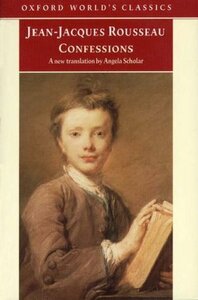You need to sign in or sign up before continuing.
Take a photo of a barcode or cover
This certainly is a unique document: especially through its introspection and boldness. It explains a lot of Rousseau's later behaviour. But, to be honest, after a while the personality of Rousseau really gets irritating. And that makes the reading a little bit tedious.
It took me a month to finish this and I felt his spooky eyes on the cover following me when I neglected him and picked up a different book. Got there in the end, though.
"I have never thought so much, existed so much, lived so much, been so much myself, if I may venture to use the phrase, as in the journeys which I have made alone and on foot. There is something in walking which animates and enlivens my ideas. I can scarcely think when I remain still; my body must be in motion to make my mind active. The sight of the country, a succession of pleasant views, the open air, a good appetite, the sound health which walking gives me, the free life of the inns, the absence of all that makes me conscious of my dependent position, of all that reminds me of my condition – all this sets my soul free, gives me greater boldness of thought, throws me, so to speak, into the immensity of things, so that I can combine, select, and appropriate them at pleasure, without fear or restraint."
"I have never thought so much, existed so much, lived so much, been so much myself, if I may venture to use the phrase, as in the journeys which I have made alone and on foot. There is something in walking which animates and enlivens my ideas. I can scarcely think when I remain still; my body must be in motion to make my mind active. The sight of the country, a succession of pleasant views, the open air, a good appetite, the sound health which walking gives me, the free life of the inns, the absence of all that makes me conscious of my dependent position, of all that reminds me of my condition – all this sets my soul free, gives me greater boldness of thought, throws me, so to speak, into the immensity of things, so that I can combine, select, and appropriate them at pleasure, without fear or restraint."
livres I à V : mis à part la ressemblance entre rousseau et mon prof d'histoire (qui est d'autant plus effrayante lorsque l'on sait qu'ils partagent le fait de parler un peu trop de cul) c'était très drôle (surtout l'aventure avec mme de W...). le livre I est bien, au delà ça devient un peu chiant.
inspiring
reflective
slow-paced
I'm totally counting for my English class reading, since I actually read this with more intent than anything I've read in the past, oh, 15 years. what? fine, 17 years, hush up.
I actually enjoyed it too, Rousseau turns out to be hilarious if you don't take him too seriously. and what a pervert! surprise surprise surprise.
I actually enjoyed it too, Rousseau turns out to be hilarious if you don't take him too seriously. and what a pervert! surprise surprise surprise.
informative
reflective
slow-paced
Really just an astonishing memoir, and not at all what I was expecting. Instead of a dry, didactic, rationalist, Enlightenment-era reflection, this is a warts-and-all, somewhat unreliable, page-turner that includes several jaw-dropping revelations. He gave all five of his children away to a foundling hospital!! He shacked up with his mistress Therese (who was the daughter of his servant). He was involved in at least one menage a trois.
The Confessions does not include any discussion of Rousseau's philosophy, although through his gradual turn to misanthropy and his retreat to nature, he exemplifies a sort of proto-Romantic hero. Because his work was considered heretical by the Jesuits in France, he was forced into exile and spent several years running from one safe haven to another. The Confessions is the earliest memoir I have read that feels contemporary. Augustine's Confessions were written ultimately to make converts; Rousseau on the other hand, wants to tell the truth of his life.
The Confessions does not include any discussion of Rousseau's philosophy, although through his gradual turn to misanthropy and his retreat to nature, he exemplifies a sort of proto-Romantic hero. Because his work was considered heretical by the Jesuits in France, he was forced into exile and spent several years running from one safe haven to another. The Confessions is the earliest memoir I have read that feels contemporary. Augustine's Confessions were written ultimately to make converts; Rousseau on the other hand, wants to tell the truth of his life.
challenging
reflective
medium-paced




